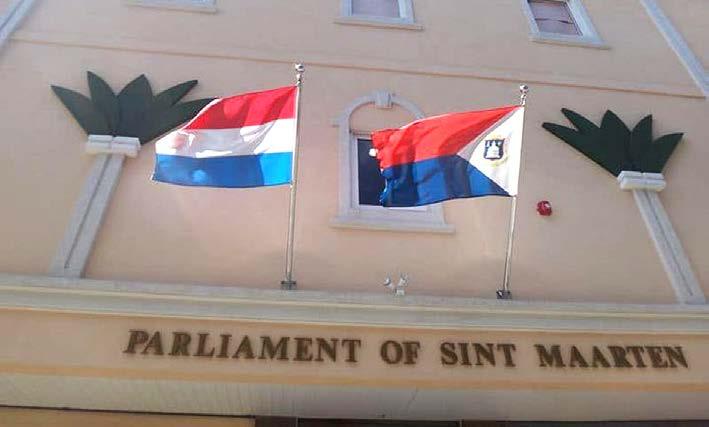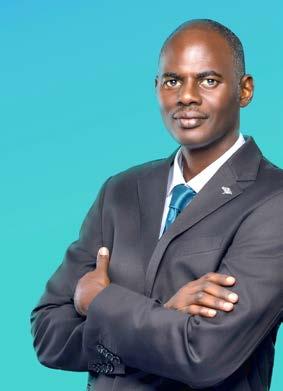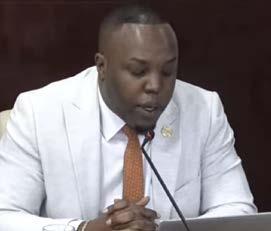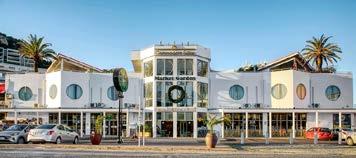






PHILIPSBURG -- It is not at all certain that the parliament will approve the proposal to save Ennia from bankruptcy and thus protecting the interest of its policy holders. Finance Minister Marinka Gumbs presented a detailed overview of the proposal (see related story) but she said at the same time that what is now on the table is not the best solution for St. Maarten.
“If you say that this is not the best solution, then take your time and present a better one,” MP and former Minis-
ter of Finance Ardwell
Irion said. He noted that Gumbs had sought advice from (also former) Minister of Finance Richard Gibson Sr. and quoted Gibson saying in a radio interview that policy holders had never been at risk. Irion and other MPs like Cloyd Marlin wanted to know in which capacity Gibson had advised the minister. Was it as a former minister, as a former board member of Ennia or as the personal advisor of Hushang Ansari?
MP Fernando Lacroes expressed his doubts: “I start to believe that nobody wants this to hap-
pen.” he said. Lacroes asked why the proposal requires the approval of St. Maarten and whether it is possible to migrate Ennia policy holders to the local general pension fund APS. The MP was clearly not happy with the idea that the government has to pay for the solution: “Ansari is responsible and he needs to pay. Why do we not seek the funds from him?”
MP Christophe Emmanuel flat-out opposed the proposed solution. “It is a bad agreement and it is not good for St. Maarten.”
Emmanuel said that another solution needs
to be found, wondering why the government does not go after Ansari. Several MPs asked questions about the projected 180 million guilders ($100,558,659) sales value of Mullet Bay. “Where does that come from?”
MP and President of Parliament Sarah Wescot-Williams pointed out that the court will appoint an appraiser in September because Ennia and Ansari were unable to agree on a suitable candidate. The court in Curacao will appoint Greg Becker of the Canadian real estate management company Colliers as ap-
praiser. He will have to determine the fair value of Mullet Bay. Wescot-Williams also asked whether the beach is included in the intended sale of Mullet Bay.
Several MPs had trouble with the fact that the solution for Ennia is linked to the interest percentage St. Maarten will have to pay for its 316 million guilders ($176,536,313) Covidloans. “The international community says that countries should not push additional loans on small developing countries,” MP and former Prime Minister Silveria Jacobs said.
PHILIPSBURG --
“Every discussion about the future of our kingdom is completely meaningless as long as article 73 of the United Nations Charter is considered as a given.” This statement is part of an article written by Sietse Fritsma, a former parliamentarian for the extreme right party PVV. The question is whether Fritsma’s ideas will resurface now that the PVV will be a part of the new Dutch government.
Fritsma’s explanation of Article 73 is that the interests of the inhabitants of the Caribbean islands come first and that their wellbeing must be promoted “in order to ensure their progress in politics and economic and social progress as well as their progress in the fields of education, their just treatment and their protection against abuse, with respect for their culture.”
In 2013 Fritsma authored concept-legislation aiming to return criminal Antilleans to Curacao, Aruba and St. Maarten. The concept was based on a draft law from former minister Rita Verdonk that never became a reality. Fritsma’s idea went nowhere either, though the message is clear: he still wants to get rid of the Caribbean part of the Kingdom. The problem, he writes in his article, is Article 73 of the UN Charter. Since its inception in 1945, the Charter was amended only five times

and all of those amendments had to do with the expansion of the United Nations. Fritsma is frustrated that the Netherlands is the only country in the Kingdom that cannot abolish the ties with the other countries.
“Article 73 means that the Netherlands is the only country in the kingdom that does not have the right to self-determination,” he wrote.
Political proposals to change the relationship with the islands, for instance by turning the Kingdom into a Commonwealth, “always hit the concrete wall of the Charter which indicates that the wishes of the Netherlands are irrelevant.”
Fritsma balks at the notion that the current constellation of the kingdom is the result of history. “The Netherlands took the islands in the past and this carries a responsibility. That position is untenable. How logical is it to eliminate the right to self-determination and the democracy of a country from one generation to the next?”
Fritsma argues that those who want to continue with their burden of care for the islands could submit a claim to France and Spain, countries that have occupied the Netherlands in the past.
Fritsma laughs at the possibility that the citizens of the islands could themselves take the initiatives to step out of the kingdom. “Of course they won’t do that. Nobody is going to tear up a winning ticket from the state lottery. The UN

Charter is a free insurance policy that covers all aspects of a society, from the economy to education.”
Fritsma is of the opinion that the Netherlands should be entitled to take its own decisions about the relationship with the islands of the former Netherlands Antilles. He mentions two options to change the situation in favor of the Netherlands: starting an amendment procedure (to change Article 73) and terminating membership of the United Nations.
To take control over the right to self-determination requires political will, Fritsma realizes: “Until now that will has remained elusive among almost all political parties that have been saying for decades that this cannot go on and that something has to change. But what is not there can still come.”
Fritsma is a former employee of the Dutch Immigration and Naturalization Service (IND). In 2007 he published a book entitled The Immigration Disaster of the Netherlands.
Fritsma was born on March 12, 1972, in Franeker (province of Friesland) as the son of a fisherman. He studied social geography. After his political career, he established a travel agency.
As a parliamentarian, he proposed in 2008 to kick Moroccan youngsters and their parents out of the country if they committed a crime.


WILLEMSTAD -- After Insel Air ceased operations on February 16, 2019, it was replaced by another Curacao-based airline called Jetair. Five years later, on June 18, 2024, Jetair filed for bankruptcy and the Court in First Instance confirmed its status. Both Insel Air and later Jetair were the national airlines of Curacao.
Jetair was founded in 2006 as United Caribbean Airlines and rebranded as Jetair Caribbean in 2019. After the court declared both entities bankrupt, Jetair canceled all flights and the company’s planes were grounded. The trustees in the bankruptcy, attorneys of HBN Law &Tax reported the possibility of a restart to Minister Ruisandro Cijntje of Economic Development. Media reports suggest that there are several interested buyers on the market. Awaiting the outcome of acquisition talks, the trustees, the government and the director of the Social Insurance Bank
have all asked to lift the bankruptcy.
Jetair had already an Air Operators Certificate (AOC) for charter flights. In November 2019 it received its AOC for scheduled flights and the company was recognized as Curacao’s national airline. Antonio Ribeiro (center in the above file photo), the director and owner of Jetair explained the reasons for the downfall of his company in a written statement that was published by Antilliaans Dagblad and Amigoe. Ribeiro founded and managed Curacao Telecom that was acquired by the Digicel Group of companies in 2005.
Ribeiro states that shortly after Jetair received its AOC for scheduled flights, activities came to a standstill due to the COVID-19 crisis. The airline was unable to execute any flights for a period of two years.
In the meantime, its two Fokker-70 planes had to undergo required maintenance controls at a cost of €2.5 million ($2.68 mil-
lion) while other operational costs continued. According to Ribeiro two factors contributed to the downfalls of his airline. First of all there is the fact that the American Federal Aviation Authority (FAA) degraded Hato Airport in 2012 from Category 1 to Category 2, because it did not meet all international requirements for flight safety. Because of this, Jetair was banned from flying with its own planes to destinations in the United States.
As the second reason Ribeiro refers to the lack of support from the local government. While the Dutch government supported its national airline KLM with a subsidy of 9 billion ($9.6 billlion), Jetair had to do everything on its own. Even St. Maarten’s airline Winair received subsidies from its government.
Ribeiro acknowledges that, after a lot of begging, Jetair received a modest subsidy from Curaco for a period of eight to nine months. But the subsidy was not even enough to cover the salaries of the airline’s
personnel. Ribeiro, who retired fourteen years before he started the air-
line, was not planning to give up. He kept the company technically out of bankruptcy by putting up his own money, thinking: “The best days of Jetair are still to come.”
But it was not to be. In his statement, Ribeiro apologizes to everyone who suffered damages because of the bankruptcy. “I wanted to do something big for Curacao because this is where I grew up. I ask clients who became the victim of this situation for forgiveness. It was never our intention to benefit from clients who innocently bought their tickets.”


PHILIPSBURG -- The structure of the tariffs used by Utilities Company GEBE are a stumbling block on the road to energy transition, it appears from a report by TNO, the independent Dutch organization for scientific research.
Currently, GEBE charges a base tariff of 0.25 guilders ($0.13) and a variable component for the cost of fuel, the socalled fuel clause. This clause covers the cost of the fuel GEBE has to buy to power its dieselgenerators and the basetariff should cover the company’s operational costs - but it doesn’t.
TNO published its report entitled The energy transition of Aruba, Curacao and Sint Maarten on May 2 of this year, labeling it as “a roadmap for climate-neutral energy provision.”
DP-MP and President of Parliament Sarah Wescot-Williams has requested an urgent meeting of the parliamentary
VROMI-committee to discuss the contents of the report and the availability of subsidies for St. Maarten through the SDE++-program. “The government needs to take a stance on this report and adjust our energy goals with haste,” she stated in a press release. “We do not need another study, as the expertise to get us there is available.”
The SDE-program offers subsidies for projects that aim to reduce CO2emissions. Applications for a subsidy have to be submitted between September 5 and October 5.
The Dutch government has made a budget of €11.5 billion ($12.5 billion) available for the program.
The TNO-report states that Aruba generates 20 percent of its electricity from renewable sources; in Curacao that percentage in 30 and in St. Maarten it is unknown but, according to the report, “very limited.”
The fossil installations of GEBE are outdated and cannot meet demand anymore, the re-
port states. “Investment in new production capacity is very urgent.” According to the TNOresearchers solar energy is the best option for St. Maarten, though such a transition would require improvements of the distribution network. Transition to renewable energy is challenging, because it will result in less revenue that does not cover the expenditures of GEBE. There are however several options: photo-voltaic (solar panels), waste burning, geothermal energy, cooperation with the French side and the use of hydrogen and biofuels.
“Wind and solar energy projects are profitable compared to electricity production with fossil fuels,” the report states. On the other side of the coin are the costs associated with a transition. GEBE would have to invest in the quality of its distribution network, in battery-storage, adjustable power and backup capacity. “System costs can be charged to consumers,” the report
states.
There is an important unknown factor: it is unknown which investments are needed for large-scale electricity production with solar panels and for the improvement of the distribution network.
Currently GEBE’s production capacity is 75.4 MegaWatt. The company has twelve generators and five of them are older than 25 years, while their expected lifespan is 34 years. In 2023 the peak demand was 55 Megawatt.
Unlike Aruba and Curacao, St. Maarten has not made any steps towards the use of electric vehicles. Shore power for cruise ships could generate revenue for the company, but its limited production capacity is a problem. The port is the only entity that has made some strides towards renewable energy with twenty electric vehicles and plans to replace all of its vehicles within the next five years with electric cars.
The report briefly refers to Gridmarket, an Amer-
ican consultancy that proposed in 2023 to execute the energy transition in St. Maarten. Disagreements and a lack of proper cooperation have thrown a spanner in the works. Gridmarket’s plan involved photo voltaic installations, offshore wind energy, batteries and the use of bio fuels. The proposal was to have a third party take care of sustainable electricity production and to have GEBE buy from this company and deliver the product to consumers.
The TNO-report notes that there are significant risks associated with privatizing the production of electricity. The report also found an interesting dilemma. Photo voltaic electricity production is an interesting option because the peak demand for power falls between 10 o’clock in the morning and two o’clock in the afternoon. However: investing in PV is not attractive for GEBE, because the company would only receive the base tariff and that money would not only have to cover the costs of PV-projects but also all other expenditures at GEBE. “Financially it is more attractive for GEBE to produce based on heavy fuel oil and not to invest in PV,” the report states.
The fuel-clause, the variable part of a GEBE-bill depends on the consumption of fuel. After an energy transition the use of fuel diminishes and with it GEBE’s revenue from this source goes down as well. “With the current tariff-structure energy transition only results in more financial problems for GEBE,” the authors of the report conclude.
PHILIPSBURG -- The Common Court of Justice will appoint Greg Becker of the Canadian real estate management company Colliers as appraiser for providing an advice about the fair value of Mullet Bay.

Collier was established in 1976 and is headquartered in Toronto. The company has around 19,000 employees in 400 offices in 66 countries. Colliers’ annual revenue is $4.5 billion and it has $98 billion worth of assets under management. Greg Becker is an associate managing director for West Palm Beach and the Caribbean.
The court decided to appoint the appraiser because the parties disputing court rulings about insurance company ENNIA could not find common ground.
Hushang Ansary, Abdallah Andraous, Ralph Palm, Parman International, Nina Ansary and Gijsbert van Doorn initiated a lawsuit against ENNIA in which they contest previous court rulings but the court dismissed all their requests for a revision.
The court ruled on September 12, 2023, that it needs expert advice about the true value of Mullet Bay to determine whether dividend payments and payments to supervisory directors between 2009 and 2015 were lawful. The true
value of Mullet Bay will determine the finan cial position of ENNIA at the time when those payments were made. The law states that such payments are prohibited if a company’s capital is negative or could be come negative because of these payments.
There is also a dispute about the value of En nia’s 40 percent stake in Stewart and Stevenson. According to Ansary that value is $79 mil lion, while experts come up with a completely different number: $247 million.
The court ruling, dated June 18, points out that omitting an objective valuation of Ennia’s stake in Stewart and Stevenson is unlawful and obliges those re sponsible for it to pay damages. To determine those damages, the court assumed a value of $233 million.

Parman International told the court that, due to the willingness of St. Maarten, there are no limitations for the development of Mullet Bay. If this is correct it will have an effect on the property’s value (and by extension on the lawfulness of dividend payments) and therefore the court will ask the appraiser to investigate this issue.
The court will appoint Becker during a court hearing scheduled to take place on September 24. It will set a deadline for his report at a later date.





SAM-party-registration-1
PHILIPSBURG -- Two new political parties will contest the August 19 parliamentary elections: the Soualiga Action Movement (SAM) and the Oualichi Movement for Change (OMC).
The founder of the latter party is businessman Olivier Arrindell. The Electoral Council confirmed the party’s retroactive registration per May 31, 2024.
Nathalie Tackling, the chairlady of the Electoral Council confirmed that both parties are eligible to take part in the elections. The admission of both parties is based on “an instruction by the prime minister to adhere to June 17 as the deadline for registration,” Tackling told StMaartenNews.com. The legal basis for this decision remains unclear. Applying the deadline mentioned in article 16 of the national ordinance registration and finances political parties would potentially have result-
ed in trampling passive voting rights, Tackling stated.
Article 16, paragraph 2 of said ordinance states that parties that register within six weeks of Postulation Day will not be eligible to take part in the upcoming elections. The national decree that set Election Day for August 19 does not contain a deadline for the registration of new political parties and it sets the date of Postulation Day at July 2. Based on these dates a strict application of the law would not have blocked the registration of new political parties at the Electoral Council, but it would have barred those parties from taking part in the August 19 elections.
The Soualiga Action Movement is spearheaded by former Member of Parliament Franklin Meyers. Claude ‘Chaco’ Peterson is one of the prominent names on the list.
PHILIPSBURG -- Two new political parties will contest the August 19
parliamentary elections: the Soualiga Action Movement (SAM) and the Oualichi Movement for Change (OMC). The founder of the latter party is businessman Olivier Arrindell. The Electoral Council confirmed the party’s retroactive registration per May 31, 2024.
Nathalie Tackling, the chairlady of the Electoral Council confirmed that both parties are eligible to take part in the elections. The admission of both parties is based on “an instruction by the prime minister to adhere to June 17 as the deadline for registration,” Tackling told StMaartenNews.com. The legal basis for this decision remains unclear. Applying the deadline mentioned in article 16 of the national ordinance registration and finances political parties would potentially have resulted in trampling passive voting rights, Tackling stated.
Article 16, paragraph 2 of said ordinance states

that parties that register within six weeks of Postulation Day will not be eligible to take part in the upcoming elections. The national decree that set Election Day for August 19 does not contain a deadline for the registration of new political parties and it sets the date of Postulation Day at July 2. Based on these dates a strict application of the law would not have blocked the registration of new political parties at the Electoral Council, but it would have barred those parties from taking part in the August 19 elections.
The Soualiga Action Movement is spearheaded by former Member of Parliament Franklin Meyers. Claude ‘Chaco’
Peterson is one of the prominent names on the list.
The Oualichi Movement for Change, founded by Olivier Arrindell, boasted in a press release issued earlier this month that it aims to secure a majority in parliament and that it wants to turn St. Maarten into “the Switzerland of the Americas.” The party also wants to initiate an operational audit of the tax inspectorate.
The party’s coat of arms shows two pelicans on both sides of an indian woman that depicts Mama Oualichi, according to Arrindell. Above its abbreviation (OMC) the party writes its name as Oualichi Mouvement for change.







THE HAGUE -- Instead of Nicolien van Vroonhoven-Kok, the number two on the list of Pieter Omtzigt’s party New Social Contract (NSC), Zsolt Szabo, a member of Geert Wilders’ antiimmigration Party for Freedom (PVV) will become the new State Secretary for Digitalization and Kingdom Relations. That is, as the Dutch newspaper Trouw reported, “bad news for the islands.”
Ferenc Zsolt Szabo is described as a seasoned politician for the VVD, but his appointment to the post is on behalf of the PVV.
Szabo, 62, is currently the vice-president of ITcompany Capgemini and the vice-chairman of ECP, a platform that promotes the advancement of the information society. Between 2003 and 2006 Szabo was the VVD-spokesman for ICT and development cooperation. Szabo also func tions as chairman of the Do-Not-Call-Me register

in the Netherlands. He has no apparent connection to the Caribbean part of the Kingdom.
Whether Szabo’s appointment is really bad news for the island remains to be seen. However, only three years ago PVV-parliamentarian De Graaf stated in a debate about the budget for Kingdom Relations that it is time for the islands to “step onto the road towards maturity”: ”This is the moment to go and do it all by yourself.” The government accord, signed by the same PVV together with its coalition partners VVD, BB and NSC states something completely different: “The Netherlands considers the Caribbean part of the Kingdom as valuable.”
How the new State Secretary for Kingdom Relations, who represents a party that would rather kick the Caribbean islands out of the Kingdom, is going to live up to that statement remains


PHILIPSBURG -- Politicians are jumping on the energy-crisis bandwagon expressing different concerns and suggestions. URSM-MP Richinel Brug addressed concerns about public health, while DP-MP and President of Parliament Sarah Wescot-Williams suggested a public private partnership as a way to solve the crisis at utilities company GEBE.
Brug stated in a press release that frequent power outages affect frozen food, adding that he received several calls from citizens about this issue. “Some supermarkets do not have a generator while others are not working properly,” he observed. “This could lead to food poisoning.”
Brug acknowledges that the troubles at GEBE should not become a political football. “Coalition and opposition partners need to come together to move our country out of this current state of crisis.”
In another press release, MP Wescot-Williams points out that the Democratic Party supports the current government and that it is therefore co-responsible for its decisions. However, she notes, “if we are called on for support we must have all information.”
The Democratic Party is “actively pushing a green energy agenda,” the press release states. At the same time there are concerns about the agreement the previous
government made with Gridmarket. “It limits the chances to get the best option for green energy,” Wescot-Williams states, adding that she will continue to demand insight to the Gridmarket-agreement.
MP Wescot-Williams has requested a debate in the parliamentary VROMI-committee about the TNO report entitled The energy-transition of Curacao, Aruba and Sint Maarten - and she must therefore be familiar with its contents.
The TNO-report notes that Gridmarket, an American consultancyfirm, proposed in 2023 to execute the energy-transition in St. Maarten. Nothing came of it, due to “disagreements and a lack of proper cooperation.”
Gridmarket’s plan involved photo voltaic installations, offshore wind energy, batteries and the use of bio fuels. The proposal was to have a third party take care of sustainable electricity production and to have GEBE buy from this company and deliver the product to consumers.
The MP furthermore emphasized that all players who are involved in the current energy-crisis must be held accountable. “But rapid decisions about the supervisory board or the management board without a plan how to proceed put us back and that we cannot afford.”
The press release labels
the 2024 capital expenditures budget as far too ambitious. “Since we lack execution capacity would not a public private partnership concept be an ideal alternative?”
That is exactly what the previous government had in mind when it signed an agreement with Gridmarket. So far results remain elusive.
The TNO-report also indicates that the DP’s push for green energy is going to kill GEBE. “Financially it is more attractive for GEBE to produce based on heavy fuel oil and not to invest in PV (solar panels),” the report states. “With the current tariff-structure energy transition only results in more financial problems for GEBE.”
DP: Prioritize the urgent electricity supply to the nation but do not loose sight of the other matters surrounding GEBE, such as the shareholder’s (government), supervisory board’s and management’s roles, responsibilities and accountability.
“If you listen to some opposition members, you would think the council of ministers is out of place by supplying its coalition partners with information regarding the very urgent situation of electricity supply in the country”, DP Leader Wescot-Williams stated in a press release on Sunday.
“The difference being that we (DP) support this government, and thus are also responsible

for the decisions taken by the government, especially for the critical and urgent matters we are currently facing with our electricity company. If we are called to support or defend any action of government, we must have all information and be able to express our party’s views.”
The MP emphasized, “A stable energy supply is priority number one for the Democratic Party for reasons explained before. However, we are and will remain critically observant of the decisions taken, and we are entitled to question the information provided to the ministers by the company. I can only hope additional answers will be forthcoming on Tuesday during the continuation of the parliamentary meeting on GEBE.”
In this light, the ongoing negotiations are closely monitored and
as a coalition partner with a signed coalition agreement, we are entitled to propose solutions and even give our input. However, we need to always observe the roles and responsibilities within a company’ structure and hold the respective players accountable for their role, the DP leader made very clear...........





PHILIPSBURG -- “It is imperative for St. Maarten to look into renewable energy sources and alternative energy sources. The COVID-19 crisis has shown St. Maarten that making deep structural changes and reforms is unavoidable,” Annex IX of the European territorial multiannual indicative program (MIP) states.
The program has €7.7 million (around $8.2
million at the current rate of exchange) available for initiatives in the fields of sustainable and resilient energy and cross-border cooperation. There is even more European money on the line for St. Maarten: €42.67 million ($45.66 million) through the Resilience, Sustainable Energy and Marine Biodiversity Program and €21 million ($22.47 million) via the 2021-2027 Caribbean regional program for the sustainable management of Caribbean OCT’s natural

contribute to the fight against climate change.
capital. (OCT stands for Overseas Countries and Territories). St Maarten also qualifies for the €15 million ($16.05 million) Decision on the Overseas Association including Greenland (DOAG) which provided Saba with a new solar park.
St. Maarten is also eligible for benefiting from the InvestEU program; though the document does not mention how much money is available from this source, it does state that at least 30 percent must
The European Union describes the situation in St. Maarten in annex IX of its multiannual indicative program. Some of the information is clearly outdated and other information is remarkable, for instance the observation that the cost for producing one Kilowatthour of electricity in St. Maarten is €0.40 ($0.43). If this is accurate it is no wonder that utilities company GEBE is in financial hot water because its base tariff to consumers is $0.13 per Kilowatthour. In other words: the company is operating at a loss, assuming that the fuel clause exclusively covers the cost of fuel.
The document states furthermore that St. Maarten agreed with the European Commission that the priority area of the 2021-2027 territorial program will focus on the Green Deal, especially on “sustainable and resilient energy, under the auspices of improving the overall resilience of St. Maarten.” This approach includes crossborder cooperation with the French side of the island.
The European support for St. Maarten addresses seven targets, as specified in the country’s national energy policy. Among these targets are the ambition to reduce the dependence on fossil fuel and to increase the emphasis on renewable energy, the promotion of energy efficiency, regulating the energy market through the establishment of a regulatory body and legislation and ensuring GEBE’s sustainability.
Several factors are hampering progress in the energy sector, the authors of the document observe. They mention the existence of ongoing fuel supply contracts with big petro companies, but also the current legal and policy framework and the general lack of energy investments infrastructure.
Furthermore, the document notes that St. Maarten “has expressed interest in potentially setting up public private partnerships, particularly in the energy sector.” Apparently, the authors are unaware that the plan of going into business with the American consultancy firm Gridmarket did not meet expectations.

PHILIPSBURG - The faction of the National Alliance (NA) has requested an urgent meeting of parliament with the objective to establish an amendment to the national budget to facilitate the purchase of generators for utilities company GEBE.
The NA states in a press release that it is dissatisfied with the lack of clarity after a meeting
with Prime Minister Mercelina to discuss solutions for the energy crisis.
NA-MP and former Minister of Finance Ardwell Irion strongly disagrees with Mercelina’s statement that renting a power barge (a proposed solution) is too expensive. “I do not believe that any solution which can bring immediate relief should be deemed too expensive, without proper explana-
tion of the determining factors,” Irion stated. The former minister suggests using funds that are currently allocated for containerized generators for renting a power barge for a period of six weeks. “GEBE can make a one-year payment plan with the government through the concession agreement,” according to Irion.
Irion asks for the presence of the prime minister and the ministers
of finance and tourism, economic affairs, transport and telecommunication (TEATT) in the meeting.
“The current crisis surrounding GEBE and the island’s electricity generation has reached a critical point,” Irion writes in a letter to MP Sarah Wescot-Williams, the chairlady of parliament. “With no immediate solution in sight it is imperative that we take swift action to address this issue.”

Philipsburg, Sint Maarten (June 10, 2024) – FSHOT Company is proud to announce that it has been granted a Weapons Dealership license by the Ministry of Justice, marking it as the first and only certified weapons dealership established in Sint Maarten. This significant milestone follows years of diligent efforts and the implementation of the Weapons Policy in 2022.
The owners of FSHOT, Mrs. Ursel BiabianyGumbs, Managing Director, and Mr. Mario
Biabiany, Operations Director have been pursuing the acquisition of the Operational license for many years. They first approached the then Minister of Justice in October 2010, subsequently having secured the business license in January 2011. This pursuit, while challenging, came to fruition earlier this year when FSHOT met every requirement stipulated by the weapons policy, finally obtaining the much-coveted operational license.
With this positive development, FSHOT joins the ranks of other professional weapons dealers
in the Dutch Caribbean. The company is now fully equipped to provide professional services to licensed weapon permit holders in Sint Maarten and the broader region. FSHOT will exclusively cater to clients who have received an official gun permit from the Ministry of Justice, offering a range of services designed to meet the needs of permit holders throughout the region.
Mario Biabiany, Operations Director of FSHOT, received his gun permit in 2003, as a professional certified bodyguard. Recognizing the lack of local facilities to main-
tain and enhance his skills, Mr. Biabiany, a proficient Weapons and Ammunition Specialist, envisioned developing a shooting range business. In addition to his role as Operations Director of FSHOT, Biabiany is also the Operations Manager of their other company Viper Management Services B.V., who has served as Sint Maarten’s Recognized Security Organization (RSO) since 2012, this relates to the ISPS Code Regulation compliance of all port facilities.
Mrs. Ursel BiabianyGumbs, the Managing Director of FSHOT as
well as Viper Management Services B.V., with a diverse background in Finance, Marketing, and Sales, has been instrumental in the development of their companies. Combining their skills, over 20 years of experience in their respective fields, and determination, they make an extraordinary partnership.
FSHOT’s commitment to safety, professionalism, and excellence sets a new standard in the region, ensuring that licensed weapon permit holders have access to the highest quality services and support.

Philipsburg, St. Maarten – June 17, 2024 – MP Egbert J. Doran is requesting the upcoming Parliamentary recess to be canceled due to the ongoing national crisis. He believes it is important for Members of Parliament to remain at work and focus on finding solutions for the people.
In a letter to President of Parliament, Sarah Wescot-Williams, MP Doran highlighted the need for continued effort during these challenging times. “Our people need to know that their Members of Parliament are committed to working tirelessly on their behalf, especially during these times,” Doran wrote.
The recess is scheduled to last for a long period of six weeks, from July 2, 2024, until August 9, 2024. Doran pointed out that this break is not mandatory and can be adjusted. He argued that six weeks is too long for Members of Parliament to be away from their duties, especially right now when there are urgent issues that need ongoing attention and action.
“This is not the time for a break; it’s a time for us to be more dedicated and responsive to the needs of our country. Taking a recess now would be a disservice to the people,” he stated. By requesting the cancellation of the recess, MP Doran is urging the leaders of this country
to stay focused on addressing the crisis and to show the public that their leaders are genuinely working for them.
“I hope this request will be taken seriously and acted upon quickly. Our commitment to serving the people of Sint Maarten should never waver, and canceling the recess is a necessary step in fulfilling our duties during this crisis. It would also show that we are indeed in solidarity with our people,” Doran added.
MP Doran ended by stating that often leaders say that they understand and are also affected by the various issues of the country, but their actions contradict their statements. “It is not time for vacation. If the country is facing a crisis, the least we can do is stay on the job.” He also pointed out that since the installment of the new members of parliament in February, there have been months of semi-operation of parliament because MPs held on for three months as Ministers and thus had to perform dual functions. There were also various work visits abroad with different delegations of MPs which stalled the operations of Parliament.
To date, Parliament has truly not adjusted and started to function since before the previous election. “It is unconscionable to go on recess,” Doran concluded.


PHILIPSBURG --
Cusha Cartoons is more than a collection of 96 satirical cartoons, published on StMaartenBews. com between 2016 and 2023. Almost all of the cartoons come with back stories that offer readers a candid insight into St. Maarten’s political history during the seven years that are covered by the 244-page book.
Author Terrance Rey, the publisher of StMaartenNews.com, went all out to uncover the stories that make St. Maarten to what it is today. Satire is more than a sarcastic view on
current events; handled with care, as Rey did, it also puts a smile on the faces of those who see the cartoons, while quite some of them will just shake their heads in surprise as soon as they realize what this is all about.
Rey is a columnist for the Dutch news site DossierKoninkrijksrelates.nl; those columns are bundled in his first book: Cusha Columns. The author is also the host of News Café, a video show that is published on Facebook and YouTube.
Cusha Cartoons addresses a large number of topics; most of them focus on the antics in the political arena. A
prime example is the rant of former Member of Parliament (and now founder of the Soualiga Action Movement) Franklin Meyers against Public Health Minister Emil Lee. Meyers said that “only born St. Maarteners” are entitled to have a say about government decisions. Realizing that within his own party (the UP) there was a member of Indian descent (Sidharth Cookie Bijlani), he quickly called him to apologize. Cusha Cartoons also contains the unabridged speech of William Marlin on the occasion of Constitution Day in 2016. Quote: ”Six years might seem
like an eternity to some but it is no more than a blink in the life of a country under construction.” Marlin also called 10-10-10 - the date when the island became an autonomous country within the kingdom of the Netherlands - as “a pit stop in our march towards full sovereignty.” What else can readers expect to find in this book? There are cartoons about the ‘sanitary landfill’ appropriately renamed as Mount Trashmore, the border dispute with France in Oyster Pond about Captain Oliver’s and the statement by former Minister of Finance Richard Gibson Sr. that the govern-

ment’s IT-system “is hanging together with hanger wires and tape.” Furthermore, the book addresses the heated debate about the establishment of the Integrity Chamber in 2017, politicians (like former MP Chanel Brownbill) ducking taxes and the fall of the Marlingovernment in the aftermath of Hurricane Irma in 2017.
Cusha Cartoons also celebrates the talent of the artist behind the cartoons: James Baggett who manages time after time to turn vocal instructions into thought-provoking illustrations.
Baggett made cartoons about the arrest and detention of UP-founder Theo Heyliger, the screening process, the (never realized) Caribbean Reform Entity known by its acronym COHO and the ransomware attack on utilities company GEBE by Blackbyte in March 2022.
Cusha Cartoons contains much more than the examples described in this review: it reads as the history of, to quote former Prime Minister William Marlin, “a country under construction.”
For those who are interested in getting to know St. Maarten politics better, this book is the ultimate guide.
The print version of Cusha Cartoons is currently for sale at the Van Dorp book stores and at Adolphus Richardson Office Supplies on the Pondfill Road in Philipsburg.

By Hilbert Haar
Plans to help St. Maarten move forward in a positive direction are wonderful, unless those plans are at odds with reality, or if those plans go in the opposite direction of other plans. I remember that years ago the European Commission funded programs that aimed to discourage smoking, while the same Commission at the same time subsidized tobacco farmers in Greece. That did not make a lot of sense to me. Now we are confronted with another impressive report from the European Commission about the multiannual indicative program (MIP) for St. Maarten. Reading Annex IX of that report (which deals with the situation in St. Maarten) made me realize that European technocrats are damn good at shoving a truckload of incomprehensible acronyms down your throat, which makes reading this stuff not exactly a pleasure cruise.
The MIP makes money available for St. Maarten to move towards using renewable energy and towards cooperation with the French side of the island. At the same time, it wants to ensure the sustainability of the company that is supposed to provide electricity and water to the population: GEBE.
The European technocrats are not the only ones showing an interest in the way St. Maarten provides its
citizens (sometimes) with electricity. There is also a report from TNO, the Dutch organization for applied scientific research, entitled The energy transition of Curacao, Aruba and St. Maarten.
That report sheds some light on what is really going on with GEBE and with the politicians that have its destiny in their hands. TNO’s conclusion: the tariff structure (consisting of a base tariff and a fuel clause) makes it unattractive for GEBE to step into the market of renewable energy.
The reason? The base tariff of $0.13 is not enough. The European report confirms this, saying that the cost for the production of one KiloWatthour of electricity is around $0.43. The report furthermore states that the fuel clause (an addition to the invoice consumers receive based on the current price of fuel) is supposed to cover the costs of the fuel GEBE uses to power its generators (assuming that they are working). The base tariff should cover all other costsand it doesn’t.
The MIP nevertheless aims to push St. Maarten towards the use of renewable energy and claims that existing contracts for fuel supply with large petro companies stand in the way of that development. At least, that part got most of the attention, while in


reality the tariff structure is the real problem. Fighting climate change and moving towards the use of renewable energy is obviously a lofty ambition, though the thought comes to mind that a St. Maarten fully powered by renewable energy is not going to make a dent in global warming. And if the result is that our national utilities com pany goes bust this solu tion is surely going to be worse than the problem. St. Maarten seems to be caught between a rock and a hard place. On the one hand the European Commission is dangling a multi-million dollar carrot in front of our nose, while on the other hand a reputed scientific research organization like TNO issues a fair warning: “With the current tariff-structure energy transition only results in more financial problems for GEBE.”



On days like this I am happy that I am not a politician because our decision makers find themselves in an impossible situation. Damned if they do, damned if they don’t. I do not envy them and I wish them lots of wisdom and creativity to lead the country out of its miserable energy-supply crisis. With or without European subsidies.
Oh, before I forget: the bill for any solution, whatever it may be, will sooner or later land on your doorstep and it will not make you happy.


PHILIPSBURG --
Finance Minister Marinka Gumbs is highly critical of the proposed solution to keep insurance company Ennia out of bankruptcy. The Netherlands has made the interest rate St. Maarten has to pay over its 316 million guilders ($176,536,313) Covidloans dependent on the parliament’s approval of the rescue plan. Parliament has not approved the proposal yet but if it does, the interest rate goes from 3.4 to 2.9 percent. The lower interest rate would save the treasury 1,580,000 guilders ($882,682) per year.
Parliamentarians asked several questions but Minister Gumbs asked time to prepare all the answers and suggested that she return to parliament in around two weeks. With this in mind, the meeting was adjourned.
Minister Gumbs presented a detailed overview of the proposed solution to the parliament, saying that, without a solution, Ennia will get in financial trouble in March 2025.
“It is a forced solution
that leaves parliament no choice by dangling lower interest rates on the Covid-loans in front of our noses. We are not even allowed to discuss a partial solution or a complete forgiveness of these loans. In my opinion, this is modern slavery and I do not believe that this is the best solution for St. Maarten. I do not believe in biting the hand that feeds you but what about equality in the kingdom?”
The numbers Minister Gumbs presented to parliament are sobering, saying that for the next thirty years St. Maarten had to pay annually 2,082,000 guilders (over $1.1 million) to Ennia. This amount will be withheld from the annual dividend the country receives from the Central Bank. Currently, St. Maarten receives 4,007,155 guilders ($2,238,634) in dividend from the Central Bank. Based on the agreement, the bank will pay 15 million guilders (almost $8,380,000) per year to Ennia. St. Maarten’s share in this payment is 973,500 guilders ($543,855). The annual payments for the next thirty years are withheld from the dividend, leaving the treasury with just 951,655
Looming Crisis: Unresolved Sinkhole on Cole Bay Hill Raises Concerns
COLE BAY -- It’s been six weeks since a significant sinkhole appeared on Cole Bay Hill on May 15, 2024, and there is still no resolution in sight. As one of the main roads on the island, this area is crucial for daily commuters, and its current state is becoming a growing concern for the community.
guilders ($531,651) every year for the foreseeable future.
The proposed agreement projects that Mullet Bay will be sold to a third party for 180 million guilders ($100,558,659) and that a claim for damages will bring another 230 million guilders ($128,491,620) to the table. In that scenario, St. Maarten’s liability for the solution will be 104 million guilders ($58,100,558). In the worst case scenario (whereby Mullet Bay is not sold at all) the liability will increase to 131 million guilders ($73,184,358).
“The chances are slim to none that Mullet Bay will be sold to St. Maarten for the appraised value,” Minister Gumbs said, adding that the proposed solution will secure the interests of the policy holders and the continued existence of Ennia.
“There will be no social unrest but at what cost?” she said. “This solution will set St. Maarten back for thirty years. While we cannot get loans to cover operational costs at our prison or at GEBE, the Cft allows them for Ennia. It seems that Ennia is more important than our prison and GEBE.”
The government’s primary focus has been on the energy crisis with GEBE, almost to the exclusion of other pressing issues. This tunnelvision approach has left the sinkhole problem on Cole Bay Hill largely neglected. According to the Department of Infrastructure, the sinkhole is a result of a collapsed drain. However, no digging or investigation has been undertaken to confirm this diagnosis or assess the full extent of the damage. Recent observations indicate that the problem is expanding. Areas as far as 30 meters from the sinkhole are now showing signs of distress, with sagging asphalt and cracks spanning several meters. This situation suggests that the structural integrity of the road and the underlying earth is compromised and dete-

riorating.
MP Marlin questions the government’s delay in addressing this issue, highlighting the absence of a thorough investigation and the alarming speculation about the true nature of the problem. “Is the problem merely a collapsed drain, or is it something more severe?” The only certainty is that without proper examination and intervention, the risk to public safety increases daily.
Residents and motorists who rely on Cole Bay Hill are understandably worried. The potential for a more significant collapse could lead to serious accidents, property damage, or worse. The need for immediate action is clear, yet the government’s response has been frustratingly slow.
The recent appointment of a full-time minister offers a glimmer of hope. This issue must be addressed with the urgency it demands. The community deserves transparency and regular updates on the steps being taken to resolve this perilous situation. Timely information is especially critical if a lengthy road closure becomes necessary. Currently, there are no secondary roads for the major freight trucks that use Cole Bay Hill daily, and businesses need time to plan accordingly.
MP Marlin emphasizes the importance of the government also paying attention to this urgent matter before it escalates further. The safety and well-being of the island’s residents must be the top priority.

The following meme above went viral on St. Maarten via a Facebook post by a William Price. This inspired me to commission the following article.
~ Nation Building: Beyond Infrastructure to Human Capital Investment ~ Nation building is a term that has traditionally evoked images of towering skyscrapers, expansive highways, and advanced technological infrastructure. While these physical developments are undoubtedly crucial for the progress of any nation, they represent only one dimension of what it means to build a nation. True nation building extends far beyond bricks and mortar; it is fundamentally about investing in human capacity, human capital, and human assets. It is about equipping our people, through education, training, and empowerment, to lead and sustain the country’s progress across all sectors.
The Essence of Human Capital in Nation Building
Human capital refers to the skills, knowledge,
Moreover, education should not be static; it must evolve to incorporate the latest technological advancements and industry needs. This includes integrating STEM (Science, Technology, Engineering, and Mathematics) education with arts and humanities to foster well-rounded individuals capable of critical and creative thinking.
Training and Continuous Development
ideas are invaluable in shaping policies and initiatives that are forward-thinking and inclusive. By empowering the youth, we ensure a continuous pipeline of capable leaders who are ready to drive the nation forward.
Ensuring Inclusivity and Equity
and experience possessed by individuals, which collectively contribute to the economic and social prosperity of a nation. Investing in human capital is critical because it directly impacts productivity, innovation, and the ability to adapt to changing global landscapes. Without a welleducated, well-trained, and highly skilled population, a nation cannot hope to achieve sustainable development or compete on the global stage.
Education: The Foundation of Human Capacity Education is the cornerstone of human capital development. It lays the foundation for critical thinking, problem-solving, and innovation. A robust education system that is accessible to all citizens is paramount. This includes not just primary and secondary education, but also higher education and vocational training. Universities and technical institutes must be equipped with the resources to provide cutting-edge education and research opportunities, ensuring that graduates are well-prepared to meet the demands of a rapidly evolving job market.
While formal education is essential, continuous professional development and on-the-job training are equally important. The rapid pace of technological advancement means that the skills required today may be obsolete tomorrow. Thus, a culture of lifelong learning must be instilled within the workforce. Governments and private sector employers should collaborate to provide opportunities for ongoing training and upskilling, ensuring that workers remain competitive and industries continue to thrive.
Empowering the Next Generation
Preparing the next generation to take over the reins of leadership involves more than just education and training. It requires creating an environment where young people are encouraged to take initiative, innovate, and engage in the decisionmaking processes. This can be achieved through youth mentorship programs, internships, and opportunities for young people to participate in governance and community development projects.
Young people must be viewed not just as beneficiaries of nation-building efforts, but as active participants and leaders. Their voices and
True investment in human capital must be inclusive, ensuring that all segments of the population have equal access to opportunities. This includes marginalized groups such as women, ethnic minorities, and people with disabilities. Policies and programs must be designed to address the unique challenges these groups face, providing them with the support and resources needed to succeed.
Gender equality, for example, is not just a moral imperative but also an economic one. Studies have shown that when women are educated and given equal opportunities, entire communities benefit. Similarly, ensuring that people with disabilities have access to education and employment opportunities allows them to contribute meaningfully to society.
Ultimately, the goal of nation building through human capital invest-
ment is to create a selfsustaining nation. This means a nation that is not overly reliant on foreign expertise and resources but has developed its own pool of skilled professionals and leaders. When a country can rely on its own citizens to manage and drive its institutions, it achieves true sovereignty and resilience.
Investing in human capital is a long-term endeavor, but it is one that yields significant returns. A nation with a well-educated, skilled, and empowered population is better positioned to innovate, grow economically, and provide a high quality of life for its citizens.
Nation building is a multifaceted endeavor that requires a holistic approach. While infrastructure development is visible and tangible, the less visible investment in human capital is equally, if not more, crucial. By prioritizing education, continuous training, youth empowerment, and inclusivity, we can build a nation that is not only prosperous but also resilient and sustainable. It is through the development of our people that we can truly achieve the vision of a strong, independent, and thriving nation.

